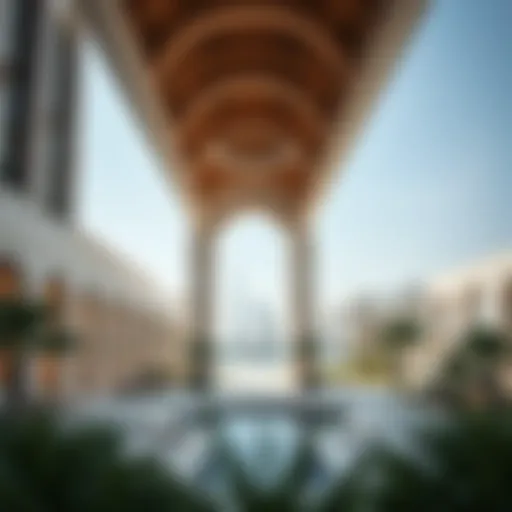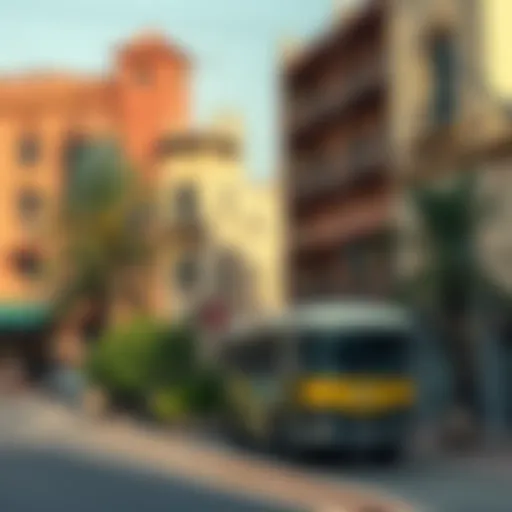Explore Naif Souq: Dubai's Historic Marketplace
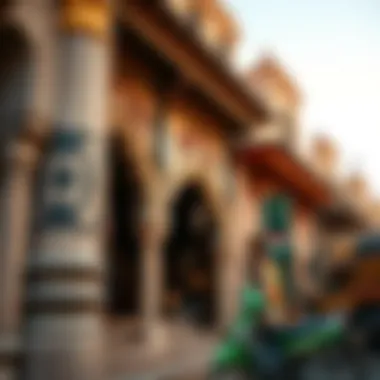
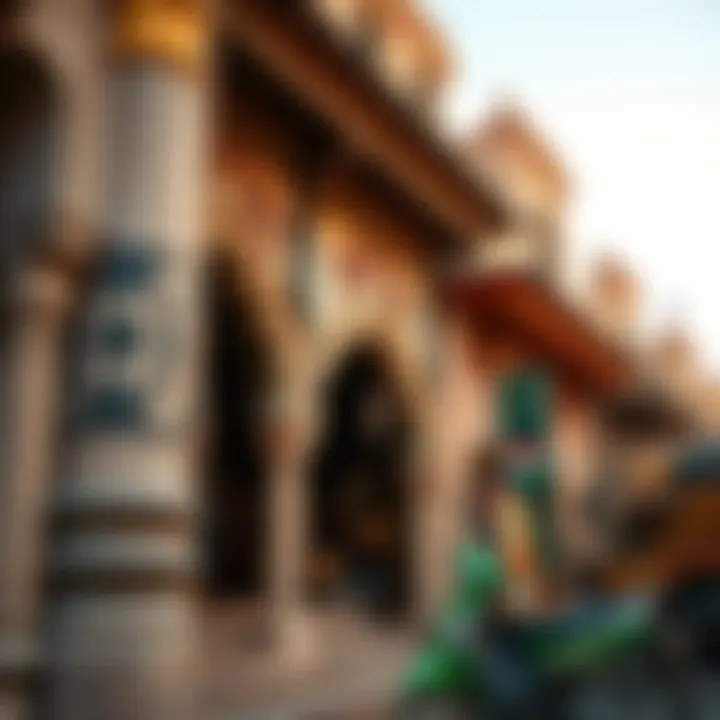
Intro
Naif Souq holds a special place in the heart of Dubai, where history meets the hustle and bustle of contemporary life. Nestled within a city known for its towering skyscrapers and luxurious lifestyles, Naif Souq stands out as a testament to the city's rich cultural tapestry. Originally a trading hub, it has evolved into a vibrant marketplace that caters to both tourists and local residents alike.
This guide aims to peel back the layers of Naif Souq, exploring not just its architectural significance and unique offerings, but also the subtler nuances that contribute to its role in the local economy and culture. By diving into the experiences you can expect when you visit, along with practical tips and insights into its impact on Dubai’s real estate market, you’ll be well-equipped to navigate this iconic marketplace with both ease and appreciation.
The relevance of Naif Souq extends beyond mere shopping; it serves as a microcosm of Dubai, where tradition and modernity seamlessly blend. From the spices that fill the air to the traditional garments that hang in the shops, each visit to this souq tells a story of the past intertwined with the pulse of present-day life in Dubai.
Let’s embark on this journey to understand Naif Souq more profoundly, appreciating its historical significance, cultural richness, and economic impact as we explore the layers that make it a vibrant fixture in Dubai’s marketplace landscape.
Historical Context of Naif Souq
Understanding the historical context of Naif Souq offers valuable insights into how this iconic marketplace has shaped and been shaped by Dubai's cultural narrative. Located in the heart of the city, Naif Souq isn’t just a place for commerce; it stands as a testament to the evolution of trade in the region. Its origins and development closely reflect the socio-economic transformations that Dubai has undergone over the decades.
Origin and Development
Naif Souq traces its roots back to the early 20th century, standing as one of the oldest marketplaces in Dubai. Originally, the area served as a trading post where local Bedouins and merchants gathered to barter goods such as textiles, spices, and traditional crafts. The souq developed organically, with traders setting up stalls in a maze-like structure that made it easy to navigate for seasoned shoppers but often bewildering for newcomers. Over the years, as Dubai began its transformation into a modern city, the souq adapted to the changing landscape, maintaining its allure while catering to both locals and tourists.
The architectural framework of Naif Souq resonates with traditional Islamic design, showcasing intricate wooden carvings and large open spaces that allow for natural light to filter in. However, the infrastructure underwent significant renovations in the last few decades, blending the old with the new. This evolution speaks volumes about Dubai’s commitment to preserving its heritage while embracing modernity.
Cultural Significance
Delving into the cultural significance of Naif Souq reveals much about the social fabric of Dubai. The souq is more than just a shopping destination; it's a gathering space where communities connect, share stories, and pass down traditions. Numerous local artisans, especially in jewelry crafting and textile weaving, have established their roots here, drawing on ancestral skills and contributing to the rich tapestry of Emirati culture.
At Naif Souq, the bustling atmosphere cannot be understated. The sight of vendors passionately showcasing their goods, the scent of spices perfuming the air, and the sound of haggling voices create an environment that is both vibrant and alive. This marketplace epitomizes what many cherish about Dubai—a melting pot of cultures where old-world charm meets the hustle of modern city life.
"Naif Souq is not merely a marketplace it’s a living history, where every corner and every stall tells a story of resilience and community."
In summary, the historical context surrounding Naif Souq sheds light on the marketplace's role not only as a hub for shopping but also as a critical piece of Islamic art, commerce, and social engagement within Dubai. Understanding this background is essential for anyone looking to navigate the intricate layers of what Naif Souq signifies in both the past and the present.
Architectural Features of Naif Souq
The architectural design of Naif Souq is not just about aesthetics; it's about storytelling, tradition, and functionality. The unique features here reflect a blend of the old and the new, signifying how the marketplace serves its community. Each structure, archway, and decorative element tells a story, fostering both a sense of place and an understanding of the cultural heritage of Dubai. Recognizing these architectural features enhances the appreciation of Naif Souq, making it clear why the souq stands as a crucial part of Dubai's identity.
Traditional Design Elements
Traditional design elements are a hallmark of Naif Souq's charm. One can’t help but notice the intricate patterns and motifs that adorn the shop facades. These designs often draw inspiration from Islamic architecture, featuring geometrical shapes and natural forms.
- Mashrabiya Windows: These wooden lattice screens help to keep the interiors cool while allowing natural light to filter through. They embody the ingenuity of local craftsmanship, providing privacy without sacrificing airflow.
- Arched Doorways: The large, welcoming arches that frame shop entrances invite shoppers in and create a sense of openness within the souq. This invites both locals and tourists to explore the vibrant stalls.
- Colorful Tiles: Many areas feature colorful ceramic tiles that tell their own stories. The use of tiles not only beautifies the surroundings but also reinforces the cultural roots of the market prior to the modern construction frenzy.
The traditional elements hold practical significance too; they serve to connect visitors to the past while they embark on their shopping adventures.
Renovations and Modern Adaptations
As Dubai evolved into a global hub, so too did Naif Souq, which has undergone renovations that respect its heritage while accommodating modern needs. This balancing act is quite evident, showing how the past can harmonize with the present. Renovations to Naif Souq have included:
- Enhanced Amenities: Modern conveniences, such as better lighting and climate control, have been integrated without compromising historical value, allowing for a more comfortable shopping experience.
- Sustainable Materials: The renovation projects often prioritize sustainability by using materials that reduce environmental impact. This aligns with global trends in architecture that seek to blend residential and commercial needs with eco-friendliness.
- Smart Technology: Innovations such as Wi-Fi hotspots and information kiosks are starting to find their way into the souq, enhancing visitor experience while keeping the soul of the marketplace intact.
In essence, the architectural evolution of Naif Souq reflects a broader narrative of Dubai's commitment to retaining its cultural identity in the face of rapid urbanization.
"Naif Souq serves as a bridge between the rich history of Dubai and its dynamic future, showcasing how heritage can thrive alongside modernity."
These adaptations make Naif Souq not just a marketplace, but a living, breathing monument to architectural resilience and cultural significance.
Shopping Experience at Naif Souq
Navigating through Naif Souq is akin to walking through a vibrant tapestry of cultures and products. This bustling marketplace offers a distinct shopping experience that stands out in Dubai, where tradition marries modernity. Visitors diving into the souq will find themselves at the nexus of tradition and commerce, highlighting the significance of local culture. The variety of goods available can be overwhelming, but that’s what makes it an alluring adventure.
The experience goes beyond mere shopping; it’s about exploring the essence of Dubai’s heritage—a blend of sights, sounds, and scents that can enthrall any passerby.
Types of Goods Available
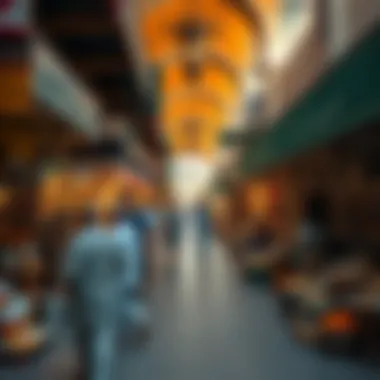
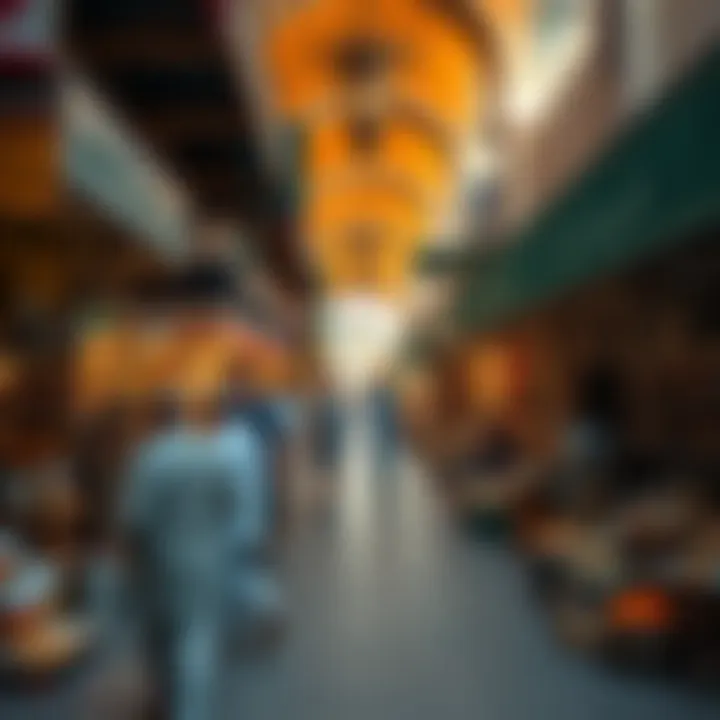
Textiles and Fabrics
Textiles and fabrics hold a special place in Naif Souq, drawing shoppers from near and far. The sheer variety is astonishing. From silks that glisten under the fluorescent lights to cottons that offer comfort and breathability, each piece tells a story. Arabic fabric is often characterized by intricate patterns and vivid colors, making it not only a staple but also a canvas for cultural expression.
Unique feature: The traditional kaftans and abayas, known for their beautiful designs, are popular among both locals and tourists. These garments not only serve everyday purposes; they are symbols of cultural identity.
Advantages: Investing in textiles from Naif Souq means embracing authentic craftsmanship. Shoppers can often find limited editions or handwoven pieces that are hard to replicate elsewhere. The downside could be the need for discerning quality, as not all vendors maintain the same standards.
Jewelry and Accessories
Jewelry in Naif Souq is another chapter worth exploring. From glimmering gold bangle sets to intricately designed silver necklaces, the accessories reflect a blend of tradition and contemporary art. Jewelry here is not just adornment; it's often embedded with cultural significance.
Key characteristic: The craftsmanship of local artisans lends a unique touch to every piece.
Unique feature: Many pieces are customizable, allowing shoppers to engrave names or special dates, which creates a personal connection to their purchase. ✔️
Advantages: The thrill of finding a rare piece can be a true treasure hunt, however, buyers should beware of the fluctuating prices based on gold market rates.
Spices and Aromatics
The spices and aromatics aisle bursts with color and intense fragrances that captivate every sense. Smells of cardamom, saffron, and various blends waft through the air, presenting a feast for the nose. This segment reflects the rich culinary history of the region, where spices play an integral role.
Key characteristic: The mix of spices, ranging from common to exotic, often attracts chefs and food enthusiasts eager to recreate authentic dishes.
Unique feature: Custom spice mixes are ubiquitous, allowing visitors to take a piece of Dubai’s culinary secrets home.
Advantages: The freshness of spices is typically unrivaled, making them a more viable option compared to packaged versions found in supermarkets. A potential challenge for buyers could be the sheer breadth of choice, which might be daunting.
Bargaining Culture
Bargaining is not just an activity in Naif Souq; it’s a revered practice that enhances the shopping experience. Visitors are often expected to haggle over prices—it’s a dance of negotiation that can be both thrilling and educational.
"In Naif Souq, the price isn’t set in stone; it’s more like clay, shaped by the skill of the barterer."
Bargaining offers several benefits: not only can shoppers secure better prices, but they also engage deeply with local merchants. Every conversation adds layers to the cultural tapestry surrounding the souq, turning a simple transaction into a rich interaction. However, it is advisable to approach this culture with respect and awareness of communal customs.
Shoppers should understand basic negotiation techniques, such as starting with a significantly lower offer and progressively moving up, which can create a harmonious resolution. Therefore, embracing the bargaining culture is part of what defines the essence of shopping at Naif Souq—it’s a journey, not just a destination.
Local Cuisine and Dining Options
Exploring local cuisine and dining options is essential when visiting Naif Souq, as it deepens the understanding of Dubai’s rich culture. This historical marketplace not only offers a plethora of goods but also serves as a gastronomic hub where visitors can taste traditional dishes and enjoy the social fabric woven into the experience of eating out. The scents of spices, the sound of sizzling street food, and the vibrant atmosphere of cafes create an inviting ambiance that makes sampling local flavors a must.
Popular Dishes to Try
Naif Souq is brimming with culinary delights. Here are some must-try dishes:
- Shawarma: A staple of Middle Eastern street food, shawarma is made by marinating meats and stacking them on a vertical rotisserie. The result is juicy, flavour-packed slices of beef or chicken wrapped in pita bread, often served with garlic sauce, pickles, and fresh vegetables. It's an unbeatable grab-and-go meal.
- Falafel: These deep-fried balls made from ground chickpeas or fava beans are not just a popular vegetarian option but also rich in flavor. When served with tahini sauce and fresh salad, they offer a balanced and satisfying bite.
- Kebabs: Skewered and grilled meat, seasoned to perfection. Whether it's lamb, chicken, or fish, each region contributes its own twist, making kebabs a favorite on many menus.
- Hummus: This creamy dip made from blended chickpeas is perfect for scooping with pita bread or vegetables. Served as an appetizer, it’s a delightful start to a meal.
- Baklava: For those with a sweet tooth, baklava is a dessert that can't be missed. This layered pastry, soaked in syrup and filled with nuts, offers a rich, indulgent finish to any meal.
Cafes and Street Food
In the heart of Naif Souq, cafes and street food stalls form a vibrant tapestry of culinary offerings:
- Cafes: These are not just places to grab coffee; they are social hubs. Traditional Arabic coffee, often flavored with cardamom, sets the tone for conversations that can last for hours. Try the local Emirati café fare, which often includes dates and sweets alongside your drink.
- Street Food: The street food scene in Naif is electric. Vendors serve a variety of dishes, from grilled corn to spicy samosas. There's an element of thrill in trying something new, and many locals are eager to share their favorites.
"Food at Naif Souq is where traditional flavors meet modern tastes, creating a delightful and sometimes unexpected experience."
Whether you’re snacking on sheep brain samosas or indulging in syrupy sweet kunafa, dining at Naif Souq offers a journey through the culinary heart of Dubai. It's not just about tasting; it's about immersing yourself in the local culture, connecting with people, and celebrating the flavors that define a community.
Visiting Naif Souq: Practical Information
Understanding how to visit Naif Souq is crucial for any traveler or local looking to immerse themselves in this vibrant marketplace. This section outlines the essential details that will enhance your experience. Whether you are a history buff, an avid shopper, or just seeking a taste of local culture, having practical information at hand can make all the difference. Let's explore opening hours, the best times to visit, and the navigating methods within and surrounding the souq.
Opening Hours and Best Times to Visit
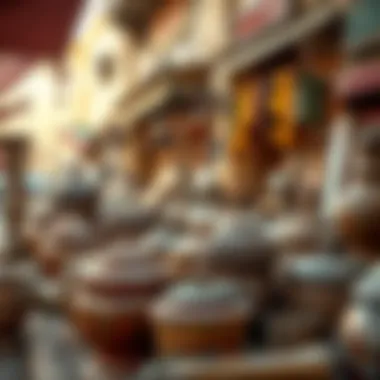
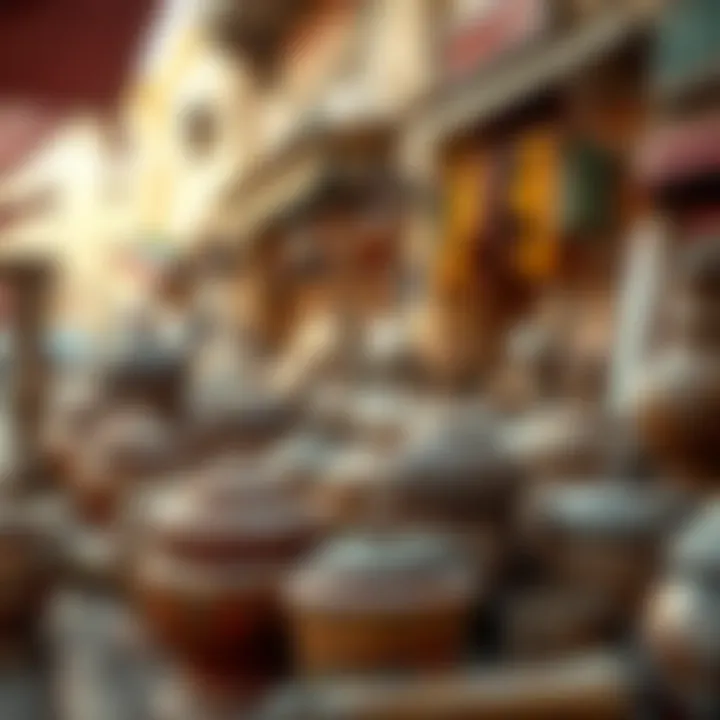
Naif Souq operates predominantly from early morning until late evening, making it accessible for various types of visitors. Typically, it opens around 10 AM and stays open until 10 PM or later during weekends. However, keep in mind that many shops might close for a few hours in the afternoon, roughly between 1 PM and 4 PM, which is common in many Middle Eastern markets.
The best time to visit is pretty much in the late afternoon or early evening when the weather is more pleasant, especially during the hotter months. This timing allows you to wander through the stalls while enjoying cooler temperatures, plus you can experience the souq come alive with locals and tourists alike.
Navigating the Area
Public Transportation Options
Getting to Naif Souq is relatively straightforward thanks to the extensive public transportation system in Dubai. The Dubai Metro offers a convenient option, with the nearest station being Al Ghubaiba. From there, a short walk will lead you right to the souq. The metro is not only efficient but also budget-friendly, making it a popular choice for both residents and visitors.
Other public transport options include buses and taxi services. The buses have several routes that pass close to Naif Souq, and they are quite economical as well. While taking a taxi is more expensive than public transport, it provides door-to-door service, which some may find more comfortable.
What’s unique about the transportation system here is the integration of various transit modes, allowing you to switch from one form to another seamlessly. Public transportation is widely used and appreciated for being reliable in connecting people to their destinations without hassle.
Parking Facilities
For those who prefer driving, parking facilities near Naif Souq are available but can be limited. On-street parking might be hard to find during peak hours, especially on weekends or during festivals. It's advisable to look for parking lots slightly further away and then walk over to the souq. This not only eases the struggle of finding a spot but also gives you a chance to soak in the surrounding atmosphere.
Some local hotels or businesses might provide parking access too, and some malls nearby offer parkingoptions that could be a few minutes away from Naif Souq. The key takeaway is to plan your parking ahead of time, as finding a convenient spot during busy periods can be less than pleasant.
Navigating Naif Souq requires a bit of planning. Whether opting for public transport or driving, consider your timing and parking options.
In summary, visiting Naif Souq is a multifaceted experience that requires a bit of strategic planning regarding your arrival. With various transportation methods and parking considerations, you can ensure that your visit is seamless, allowing you to focus on enjoying everything this historic marketplace has to offer.
Economic Impact of Naif Souq
The economic impact of Naif Souq is far-reaching, touching various facets of Dubai's bustling marketplace. Beyond serving as a historical and cultural landmark, Naif Souq plays a pivotal role in the local economy, providing jobs, generating revenue, and attracting both tourists and residents. Its unique position as a marketplace fosters an environment where local artisans, small business owners, and larger retailers can thrive.
Role in Local Economy
The significance of Naif Souq in the local economy cannot be overstated. As a vibrant trading hub, it supports numerous small businesses ranging from textile shops to spice vendors. Here are some key points illustrating its economic role:
- Employment Opportunities: Numerous shops and businesses within the souq create hundreds of jobs, from shopkeepers and craftsmen to support staff. Many local families depend on these jobs for their livelihood.
- Tourism Driver: The souq attracts a mix of locals and tourists alike. Visitors seeking authentic cultural experiences often flock to Naif Souq, enhancing foot traffic and elevating sales for shop owners. This influx bolsters the economic standing of not only the souq but surrounding businesses as well.
- Support for Local Artisans: The market also acts as a showcase for local craftsmanship. Artisans can sell their handmade goods, which encourages cultural preservation while promoting economic sustainability.
- Sales Tax Revenue: Increased commerce within the souq contributes significantly to the municipal revenue through sales taxes, allowing for potential investment back into the community, infrastructure improvements, and public services.
Effect on Real Estate Values
The presence of Naif Souq positively influences real estate values in the surrounding area. As the marketplace continues to thrive, so too does the interest in nearby residential and commercial developments. Here’s how Naif Souq impacts real estate:
- Increased Demand: Properties in proximity to the souq become more desirable due to their association with a vibrant commercial ecosystem. This demand can elevate property prices and rental rates, making it a target for investors.
- Gentrification and Development: As the area around Naif Souq develops, gentrification occurs, enhancing infrastructure and amenities. This transformation can attract higher-income residents and businesses, further driving up real estate values.
- Investment Potential: Investors often recognize the strategic importance of areas adjacent to functional marketplaces like Naif Souq. As such, they are more inclined to invest in these neighborhoods, anticipating future appreciation in property values.
In short, Naif Souq serves as a cornerstone of Dubai's local economy, bolstering both commercial activities and real estate value through its rich heritage and vibrant atmosphere.
By fostering a dynamic economic environment, Naif Souq stands as not just a commercial hub but as a vital contributor to the cultural fabric and prosperity of Dubai.
Community Engagement and Events
Community engagement at Naif Souq paints a lively picture of the local culture, creating a tapestry of interactions and shared experiences. This particular marketplace isn’t just a place for economic exchange; it serves as a communal hub where traditions flourish, and people come together. The involvement of the community is crucial for maintaining the soul of Naif Souq, especially amidst the fast-paced development happening in other areas of Dubai.
Engagement through events brings vibrancy to the souq and strengthens local ties. Festivals and celebrations are significant, allowing visitors and residents alike to connect with their cultural roots and appreciate the rich heritage around them. This shared spirit enriches the experience for shoppers, making their visits memorable while instilling pride in the local population.
Local Festivals and Celebrations
Naif Souq celebrates a variety of local festivals throughout the year, serving as a platform to showcase Emirati culture and traditions. National Day, held on December 2nd, is one of the most eagerly anticipated celebrations. The souq transforms into a colorful spectacle with decorations, traditional music reverberating through the air, and a palpable sense of joy. Locals dress in their finest attire, demonstrating their pride in their national identity.
Another important event is Eid al-Fitr, marking the end of Ramadan. The souq buzzes with activity as families and friends celebrate together, indulging in special foods, shopping for new clothes, and exchanging gifts. Special stalls often pop up, offering goodies and festive items, further enhancing the shopping experience. It’s during these times that the true spirit of community shines through, as neighbors greet each other, children run about with excitement, and the sense of belonging deepens.
Engaging events not only provide an outlet for cultural expression but also boost local businesses. Vendors see an increase in foot traffic, leading to higher sales and a sense of camaraderie forged through shared celebrations in the heart of the souq.
Artisans and Craftsmanship
The artisans at Naif Souq represent the enduring craftsmanship that connects the past with the present. Very few places can claim to have their locals still practicing the traditional arts and crafts, but here, it’s nothing short of extraordinary. Local craftsmen innovate while honoring ancient techniques, creating stunning works of art that speak volumes about their heritage.
Tourists and residents encounter unique items ranging from intricate handwoven textiles to beautifully crafted jewelry. As you wander through the pathways of the souq, you may come across a shop displaying masterfully made Dallahs, the traditional Arabic coffee pots, or delicate Arabic calligraphy that tells a story in beautiful strokes. These treasures not only highlight the skill and dedication of the artisans but also serve as reminders of the region's rich history.
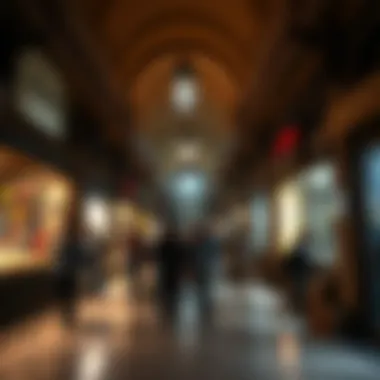
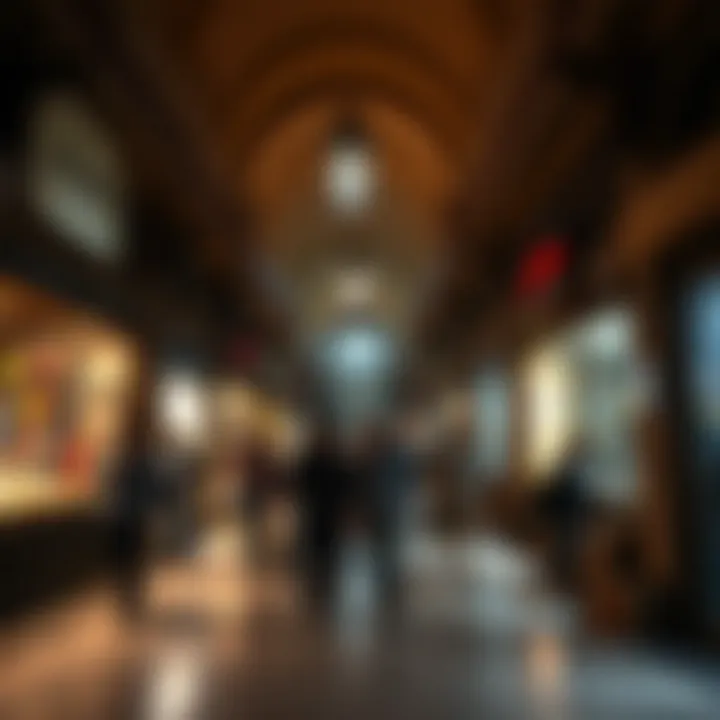
There is an enticing narrative woven into every item—each piece crafted with care holds a story that connects the buyer to the local traditions. Events held in the souq often include live demonstrations by artisans, allowing visitors to witness their detailed work firsthand. This interaction fosters greater appreciation and highlights the importance of supporting local talent.
Overall, community engagement and events at Naif Souq enhance the marketplace's vibrancy while preserving the cultural heritage that defines it. Not just a site for commerce, it stands as a testament to the community's unity and the artisans' dedication to their craft.
Sustainability Practices at Naif Souq
The importance of sustainability within the context of Naif Souq cannot be overstated. As Dubai evolves, so does its responsibility toward environmental stewardship and cultural preservation. Naif Souq stands at the intersection, embodying a blend of tradition and modernity. Understanding these practices is key for investors and stakeholders who wish to align their interests with sustainable growth in the area.
Environmentally Friendly Initiatives
In recent years, a conscious effort has emerged to incorporate environmentally friendly initiatives in Naif Souq. This reflects not only a global trend but also a local commitment to creating a more sustainable urban existence. Among these initiatives:
- Waste Management Programs: The souq has implemented programs that promote recycling and waste reduction. This helps in minimizing the environmental impact while simultaneously encouraging vendors to adopt greener practices.
- Eco-Friendly Materials: When refurbishing and maintaining the marketplace, materials that are sustainable and less harmful to the environment are prioritized. For example, the use of clay and sustainable timber enhances both the aesthetics and the ecological footprint of the souq.
- Solar Energy Applications: Solar panels have begun gracing the rooftops of Naif Souq, providing a renewable energy source that powers lighting and other essential services. Such initiatives contribute positively, reducing reliance on nonrenewable energy sources.
Efforts like these not only enhance the market's appeal but also resonate well with visitors who prefer engaging with environmentally conscious spaces, thus creating a symbiotic relationship between consumers and businesses.
Preservation of Cultural Heritage
Sustainability at Naif Souq is not solely about environment but also about preserving its rich cultural heritage. The souq plays a vital role in maintaining Dubai's historical narrative. Initiatives for heritage preservation include:
- Cultural Programs: Regular workshops and events teach the craft of traditional artisanship, ensuring that skills passed down through generations don’t fade into obscurity. This staying power is crucial for maintaining the local identity.
- Community Engagement: By involving local youths in cultural projects, there’s a renewed interest among younger generations in learning about their heritage. This promotes an appreciation for traditional customs while fostering innovation within those practices.
- Architectural Integrity: As modern renovations take place, it’s crucial that the architectural style of Naif Souq remains intact. This not only advances the visual aesthetics but preserves the soul of the marketplace, allowing visitors to experience a piece of history amid the charm of modern Dubai.
“The continuous integration of sustainability practices at Naif Souq exemplifies more than a trend; it showcases a deep-rooted commitment to cultural respect and environmental accountability.”
In essence, the practices of sustainability within Naif Souq offer a unique lens through which investors, homeowners, and expatriates can evaluate not just the commercial prospects but also the ethical implications of their involvement in this historic marketplace.
Future Prospects for Naif Souq
As the beating heart of Dubai’s traditional market scene, Naif Souq stands at a crossroad of history and modernity. Its future prospects are pivotal not just for the souq itself, but also for the broader cultural and economic fabric of the region. The marketplace's evolving character suggests that it will continue to embody a blend of heritage and contemporary innovation, attracting both locals and tourists alike.
Development Plans
In recent years, various development initiatives have been proposed to enhance Naif Souq's appeal. These development plans focus on maintaining the cultural integrity of the souq while introducing modern amenities that cater to today’s visitors. One notable aspect is the integration of technology to improve the shopping experience. For instance, initiatives could include digital directories to help navigate the maze-like paths or apps that inform about local artisans and their crafts.
Further, there are discussions around expanding the physical space of Naif Souq, with potential new sections dedicated to specific goods or cultural exhibits. This could transform the souq into not just a shopping destination but also a cultural hub, enhancing its role as a market of the future, while still paying homage to its past.
Strengthening its Market Position
To solidify Naif Souq's status as a prime shopping destination, stakeholders are focusing on marketing strategies and community engagement. One approach is to forge partnerships with local businesses and artisans, promoting their crafts while encouraging collective marketing efforts. This encourages a sense of community and tradition, which is fundamental for attracting repeat visitors.
In addition, hosting seasonal events and festivals can create buzz and draw in crowds, further solidifying Naif Souq’s position in the market. Understanding tourist trends and adjusting offerings accordingly can help ensure that it remains competitive with modern shopping centers. Moreover, employing effective social media strategies can enhance visibility, reaching wider audiences who are eager for authentic experiences.
Culmination: The Enduring Appeal of Naif Souq
Naif Souq stands as a symbol of Dubai’s rich tapestry of history, culture, and commerce. It's not just another market; it’s a living piece of narrative that connects the past to the vibrancy of today. The enduring appeal of Naif Souq can be attributed to several critical factors that foster its significance in both the local community and the eyes of visitors.
Cultural Tapestry
At its core, Naif Souq is more than a marketplace. It’s a bizarre of cultural exchanges, where different traditions meet and blend. This unique mix of heritage creates a warm and welcoming atmosphere. Visitors often comment on the sense of belonging they feel, whether they are roaming through the narrow alleyways or sifting through vibrant textiles and spices. It’s here that one can witness traditional craftsmanship right alongside contemporary artistry, revealing the depths of local talent.
Economic Pulse
From an economic perspective, Naif Souq pulsates at the heart of Dubai’s trade activities. It serves as a vital hub for small businesses and local artisans to showcase their wares, thus boosting the local economy. Investors and entrepreneurs keen on tapping into the powerful retail scene in Dubai will find opportunities flourishing here. The souq’s consistent turnover rates indicate its resilience and adaptability in a rapidly changing market.
Architectural Character
The authentic architectural features of Naif Souq also contribute to its allure. The blend of traditional design elements with modern renovations creates a visual feast. Arched walkways, intricate woodwork, and ambient lighting make for an inviting experience. This architectural harmony enhances the nostalgia that draws visitors, as they are often reminded of the bygone days when barter was king, and the souk was the heart of community life.
A Hub for Gastronomic Adventures
Food lovers find their haven here too. The textures, aromas, and flavors present in the local cuisines offered at Naif Souq tantalize the senses. From aromatic spices to delicious street food options, it’s a place where culinary diversity shines through. The fusion of flavors reflects the multicultural society of Dubai, making each bite an experience worth savoring.
The Future Path
Lastly, as Naif Souq continues to adapt to the evolving urban landscape, its future seems promising. With development plans focusing on enhancing the visitor experience while preserving its historical essence, Naif Souq is poised to remain a focal point of interest in Dubai. Tourists, expatriates, and investors alike are likely to be drawn to the charms of this storied marketplace, witnessing firsthand its continuing evolution.
In summary, the enduring appeal of Naif Souq is steadfast, driven by its cultural richness, economic vitality, architectural beauty, culinary delights, and promising future. Whether one is there to shop, dine, or simply soak in the atmosphere, Naif Souq offers an experience that resonates on many levels, making it a must-visit for anyone exploring Dubai.
"Naif Souq is more than a shopping destination; it's a living museum of our heritage, woven into the fabric of our daily lives."



